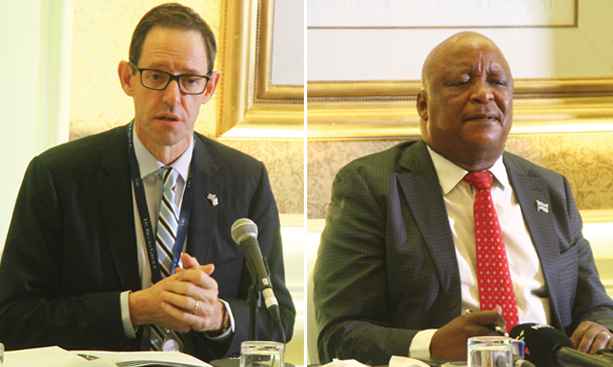The Executive Director of the Open Society Initiative for Southern Africa (OSISA), Siphosami Malunga, has put the blame for high levels of poverty and inequalities in Botswana at the feet of mining giant De Beers and the long standing diamond deal entered into between the company and government.
Speaking at a public lecture at the University of Botswana on Thursday, where he unpacked his article titled ‘’Botswana unravels: unmasking Africa’s democracy poster child’’, Malunga said government -led by the ruling Botswana Democratic Party (BDP), has kept the diamond deal a top secret from the nation, which is akin to state capture.
He said it is very disappointing for a country that is rich in diamonds to be one of those leading in inequality indexes, ranking close to the likes of South Africa who have a history of apartheid. “In South Africa we understand that there is high level of inequality because the economy in the first place was made for the white rich population. The origin of the economy exploits the blacks. The diamonds should be equally benefiting Batswana but it is not so,” said Malunga.
Malunga said the BDP government, who negotiate the deal secretly, has brought economic prosperity to a small elite group just like the Gupta family state capture saga in South Africa. He expressed concern that although the current diamond agreement contract expires in March 2021, it is not even an issue in the ongoing campaigns for the 2019 elections. Even opposition parties do not seem concerned at all, he said. “The ruling party, on the other hand, continues the renewal negotiations in complete secrecy raising concerns of another secret deal, which may even be worse than the current deal. Before that, the BDP government must disclose to its citizens the detailed nature of this deal,” part of his article reads.
Malunga said corruption in Botswana is institutionalised and rampant in many sectors, citing the education sector which is dominated by former and current cabinet ministers.“Big private schools and universities are owned by former and current senior government officials. How do you expect them to support public education? It is impossible because they benefit from government sponsorships,” Malunga said.
Elections tight
Speaking at the same forum, University of Botswana (UB) political analyst, Leonard Sesa, said the stakes are high in the 2019 general elections. He however, remains optimistic that there will be smooth tranmsition of power should the ruling BDP be defeated at the polls.
He said events that unfolded in the political space since April 2018 have brought a lot uncertainty about the outcome of the elections due in five weeks. “There is no indication that we could be heading to political instability or chaos after the elections no matter the results. The writ has already been issued. We have never postponed elections and for us to be going to vote in October as usual is a clear demonstration that all is under control,” said Sesa.
However, Sesa pinpointed a need for electoral system reforms, moving away from the current First Past the Post (FPTP), arguing that it is no longer relevant to the politics. Malunga concurred with Sesa saying Botswana remains one of the few countries that still use the archaic system while others have adopted hybrid voting systems.
Ian Khama’s power
Former president Ian Khama’s reluctance to accept that he is no longer in power, according to Sesa, is because he was born and raised under the arrangement of a ‘Government Purchasing Order’ system. “The man was born and exposed to all government control mechanisms. He went through state presidency for years both as vice president and state president. He stayed long at the military being commander as well, so he cannot easily let this all go at all,” the UB academic said.
Malunga also said the system has given Khama a lot of power as he is currently riding on his chieftaincy title to consolidate power beyond presidency. He said due to Ian Khama’s relationship to power, the politicization of ethnicity has entrenched Botswana as Khama pursues to influence his subjects (Bangwato) to turn against BDP although it is not clear if his power influence can draw Bangwato to ditch the ruling BDP.
